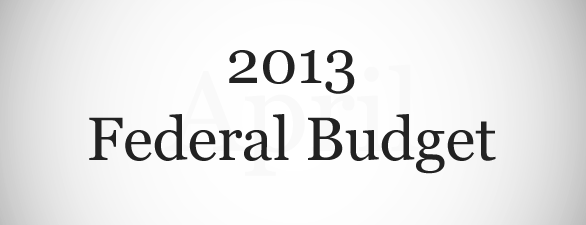
15 May Federal Budget Update 2013
14 May 2013
Much like in 2012, the Federal Budget only contained few surprises as many of the measures had already been legislated or pre-announced.
The Federal Budget Analysis prepared by GWMAS trading as MLC Technical appears below.
Summary
- The Medicare levy will increase by 0.5% to 2% pa from 1 July 2014.
- The $5,000 Baby Bonus will be removed from 1 March 2014. Instead, families eligible for Family Tax Benefit (Part A) will receive $2,000 following the birth of their first child, and $1,000 for each subsequent child.
- The superannuation concessional contribution cap will increase from $25,000 pa to $35,000 pa from:
– 1 July 2013 for people 60 and over, and
– 1 July 2014 for people 50 and over.
- From 1 July 2014, all pension asset earnings above $100,000 will be taxed at 15%.
Superannuation
Recent super reforms confirmed
Date of effect: various
The proposed reforms to Australia’s superannuation system that were announced on 5 April 2013 have been confirmed.
The key superannuation measures include:
Higher concessional contribution cap
The concessional contribution (CC) cap will increase to $35,000 pa from:
- 1 July 2013 for people 60 and over, and
- 1 July 2014 for people 50 and over.
The cap will remain at $25,000 pa for all other ages.
The table below outlines the proposed caps that will be available over the coming years.
| Age | 2012/13 | 2013/14 | 2014/15 |
|---|---|---|---|
| Under 50 | $25,000 | $25,000 | $30,000 |
| 50-59 | $25,000 | $25,000 | $35,000 |
| 60 and over | $25,000 | $35,000 | $35,000 |
Excess contributions tax reforms
From 1 July 2013, individuals will be allowed to withdraw any excess concessional contributions made from their super fund.
In these instances, excess concessional contributions will be taxed at the individual’s marginal tax rate, plus an amount for interest.
Reduced tax concessions for high-earners
Date of effect: 1 July 2012
In the 2012 Federal Budget, the Government announced that individuals with incomes above $300,000 pa will pay an additional 15% tax on their concessional super contributions. Draft legislation for this measure was recently released and was confirmed in the 2013 Budget.
Personal tax changes
No changes to tax rates
The proposed changes to the marginal tax rates and income thresholds, which were due to take effect from 1 July 2015, will no longer be going ahead.
The table below summarises the thresholds and taxation rates that will continue to apply.
| Current income thresholds | Marginal tax rates |
|---|---|
| $0 – $18,200 | 0% |
| $18,201 – $37,000 | 19% |
| $37,001 – $80,000 | 32.5% |
| $80,001 – $180,000 | 37% |
| $180,001 + | 45% |
Baby bonus to be replaced with new Family Tax Benefit payment
Date of effect: 1 Match 2014
The Baby Bonus, which currently pays $5,000 to eligible parents for each new born or newly adopted child, will be replaced from 1 March 2014.
Instead, families who are eligible for the Family Tax Benefit Part A (FTB(A)) will receive $2,000 following the birth of their first child, and $1,000 for each subsequent child. This benefit will be paid as part of their usual FTB(A) payment, instead of a cash bonus payment.
Medicare levy to increase in 2014
Date of effect: 1 March 2014
The Medicare levy will increase by 0.5% to 2% pa of taxable income from 1 July 2014. This will help raise funds to build a better life for Australians with significant and permanent disability.
Changes to self-education expense deductions
Date of effect: 1 July 2014
From 1 July 2014, tax deductions for self-education expenses will be capped at $2,000 pa for individuals.
Early HECS-HELP repayments removed
Date of effect: 1 July 2014
Up-front and voluntary early repayments under the HELP program will be removed in 2014. University and other eligible students will no longer receive a discount if they pay fees up-front or repay their HELP debt early.
Retirement incomes
Changes to tax on pension asset income
Date of effect: 1 July 2014
On 5 April 2013, the Government announced changes to the taxation of earnings in super pensions. These proposed changes have been confirmed and the following is due to apply from 1 July 2014:
- all earnings on assets that support superannuation income streams will only be tax-free up to the first $100,000 per member, and
- earnings above $100,000 will be treated as income and taxed at 15%.
Social security changes
Income free area for allowance recipients
Date of effect: 20 March 2014
The income free area for certain allowance recipients will increase from $62 per fortnight to $100 per fortnight. This means, from 20 March 2014, an individual can earn up to $100 per fortnight before their maximum allowance is reduced.
This change will apply to:
- Newstart Allowance
- Sickness Allowance
- Parenting Payment (partnered)
- Widow Allowance
- Partner Allowance Payment, and
- Partner Allowance Pension.
Family Payments
There have been a number of changes to family payments. In some cases, this will mean fewer families will receive benefits and others will see their payments reduce as their income grows.
Some key changes include:
- Changes to age eligibility from 1 January 2014: A family will only be eligible for FTB(A) until a child who is 16 years or older completes school.
- Reduction in time to claim FTB and Child Care Assistance from 1 July 2012: When claiming FTB or Child Care Assistance, families will now only have 12 months from the end of the financial year to finalise their claim and determine if they’re eligible for an end of year supplement.
Housing help for seniors
Date of effect: 1 July 2014
The Government will trial a program from 1 July 2014 to help older Australians move to more
age-appropriate housing.
The program will apply an assets test exemption to Age Pension recipients who downsize their family home. To be eligible, the family home needs to have been owned for at least 25 years and at least 80%
of the excess sale proceeds (up to $200,000) need to be deposited with an authorised institution.
The exemption also applies to people moving into a retirement village or granny flat, but not residential aged care.
Reuben Zelwer B.Acc, FFin,CFP
Director
Adapt Wealth Management Pty Ltd
Any advice in this communication has been prepared without taking account of your objectives, financial situation or needs. Because of this you should, before acting on any advice, consider whether it is appropriate to your objectives, financial situation and needs.
Adapt Wealth Management Pty Ltd ABN 76 821 231 362, registered office Suite 3 164 Waverley Road Malvern East 3145, is a Corporate Authorised Representative of CHPW Financial (AFSL 280201). From time to time Adapt Wealth Management, members of CHPW, associated employees or agents may have an interest in or receive pecuniary and non pecuniary benefits from the financial products and services mentioned herein.
The information contained in this MLC Technical is current as at 14 May 2013 and is prepared by GWM Adviser Services Limited ABN 96 002 071749 trading as MLC Technical, registered office 150-153 Miller Street North Sydney NSW 2060. This company is a member of the National group of companies.
Any advice in this Federal Budget Analysis has been prepared without taking account of your objectives, financial situation or needs. Because of this you should, before acting on any advice, consider whether it is appropriate to your objectives, financial situation and needs.
Past performance is not a reliable indicator of future performance.
Before acquiring a financial product, you should obtain a Product Disclosure Statement (PDS) relating to that product and consider the contents of the PDS before making a decision about whether to acquire the product.


